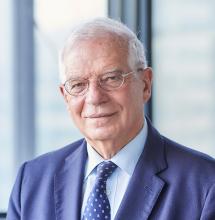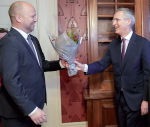You are here
Europe knows that climate action is vital to global security
Dec 02,2023 - Last updated at Dec 02,2023
BRUSSELS — “Present trends are racing our planet down a dead-end three-degree temperature rise,” United Nations Secretary-General António Guterres recently warned. He is right. Unless we act decisively, beginning at the United Nations Climate Change Conference (COP28) under way in Dubai, the threat that climate change poses to humanity will become nothing short of existential.
Already, climate change is a major risk multiplier for conflict and instability. Extreme weather events like floods and heatwaves have led to the forcible displacement of more than 20 million people each year since 2008. By 2050, more than 1 billion people may have insufficient access to water, and more than 200 million may be forced to migrate.
Water scarcity and food shortages are fuelling violent conflicts in the Sahel, the Horn of Africa, and other parts of the world. Of the 20 countries that are most vulnerable to climate change, 12 are mired in conflicts. Authoritarian countries are taking advantage of the turmoil, attempting to gain influence over fragile governments and secure access to raw materials. Unless our mitigation and adaptation efforts are equal to the climate crisis, these trends will accelerate and spread, with truly catastrophic results.
The European Union is doing its part to avoid such an outcome. With the European Green Deal, we are aiming, by 2030, to reduce our greenhouse-gas emissions by at least 55 per cent, ensure that more than 42.5 per cent of our energy comes from renewable sources, and increase energy efficiency by at least 11.7 per cent. We strive to become climate-neutral by 2050.
Central to our strategy for achieving these goals is putting a price on carbon dioxide emissions. But imposing a carbon price only on EU production risks simply pushing carbon-intensive activities beyond our borders. Such “carbon leakage” would mean losing jobs in the EU without achieving any reduction in global emissions.
That is why we implemented the Carbon Border Adjustment Mechanism (CBAM), which ensures that the most carbon-intensive imports are subject to a carbon price in line with that put on European goods. This is not protectionism. Rather, it is a necessary step to ensure that our ambitious decarbonisation measures are helpful for the global climate.
We also want to take responsibility for the greenhouse-gas emissions caused outside the EU by our consumption of imported goods, which why we are “greening” our trade policy. In particular, we want to ensure that the products we import no longer contribute to deforestation, one of the greatest threats to the climate and biodiversity. I know that the requirements stemming from this EU law are causing tensions with some of our partners. We are ready to support them in implementing these measures and to address together the challenge of deforestation.
The green transition will shake up the global balance of power. For the EU, this process implies both benefits and risks. On one hand, it will reduce our dependence on fossil fuels, a dependence that, as Russia’s war against Ukraine has demonstrated, carries high political and economic costs. On the other hand, it could create new dependencies, such as on producers of critical raw materials. Avoiding that outcome, and bolstering our security, requires us to ensure diversity of supply. To that end, we must strengthen our ties with Africa, Latin America and South Asia, developing tailor-made partnerships that allow for value-addition and job creation in our partner countries.
While Europe bears an important historical responsibility for climate change, we account for just 7.5 per cent of global emissions today, meaning that the actions we take at home can have only a limited impact on the world’s climate. The only solution to climate change is a global one. At a time when multilateralism is under growing pressure, agreement on how to meet the targets set at COP21 in Paris would not only ensure a safe future for our children, but also would show that multilateral institutions can still deliver.
COP28 must shift the world into higher gear. The EU is committed to pushing for the phase-out of unabated fossil fuels and all fossil-fuel subsidies, the doubling of energy-efficiency measures and the tripling of renewable-energy capacity worldwide. But to make this happen, we need the buy-in of the other industrialised economies, as well as China, which, despite its tremendous progress in renewables, still burns more coal than the rest of the world combined.
The green transition will succeed only if it is just and benefits all. The most climate-vulnerable countries have contributed little to climate change but risk bearing the brunt of it. While they must be part of the global race to net-zero emissions, they need and deserve greater support when it comes to climate adaptation and the green-energy transition. The EU is prepared to deliver such support, and help our partners avoid repeating our past mistakes.
The EU, its member states, and the European financial institutions are already the largest contributors of public climate finance to developing economies, having delivered 23 billion euros ($25 billion) in 2021. Moreover, the developed economies are finally on track to meet the goal of mobilizing $100 billion annually for climate adaptation and mitigation in the developing world. But we must think beyond this pledge, which ends in 2025.
It is time to align both public and private financial flows with the goals laid out in the Paris climate agreement, and take climate finance from billions to trillions. At the same time, the international financial institutions and multilateral development banks need to be reformed, so that they can do more to support the delivery of global public goods. And the new Loss and Damage Fund needs the appropriate financial firepower. The first substantial pledges are encouraging. Here, too, China will be an indispensable partner.
In an increasingly multipolar world, shaped by the return of great-power politics, concerted international cooperation might seem far-fetched. But in the face of such a global existential challenge, we must succeed.
Josep Borrell, high representative of the European Union for Foreign Affairs and Security Policy, is vice president of the European Commission for a Stronger Europe in the World. Copyright: Project Syndicate, 2023.













Add new comment